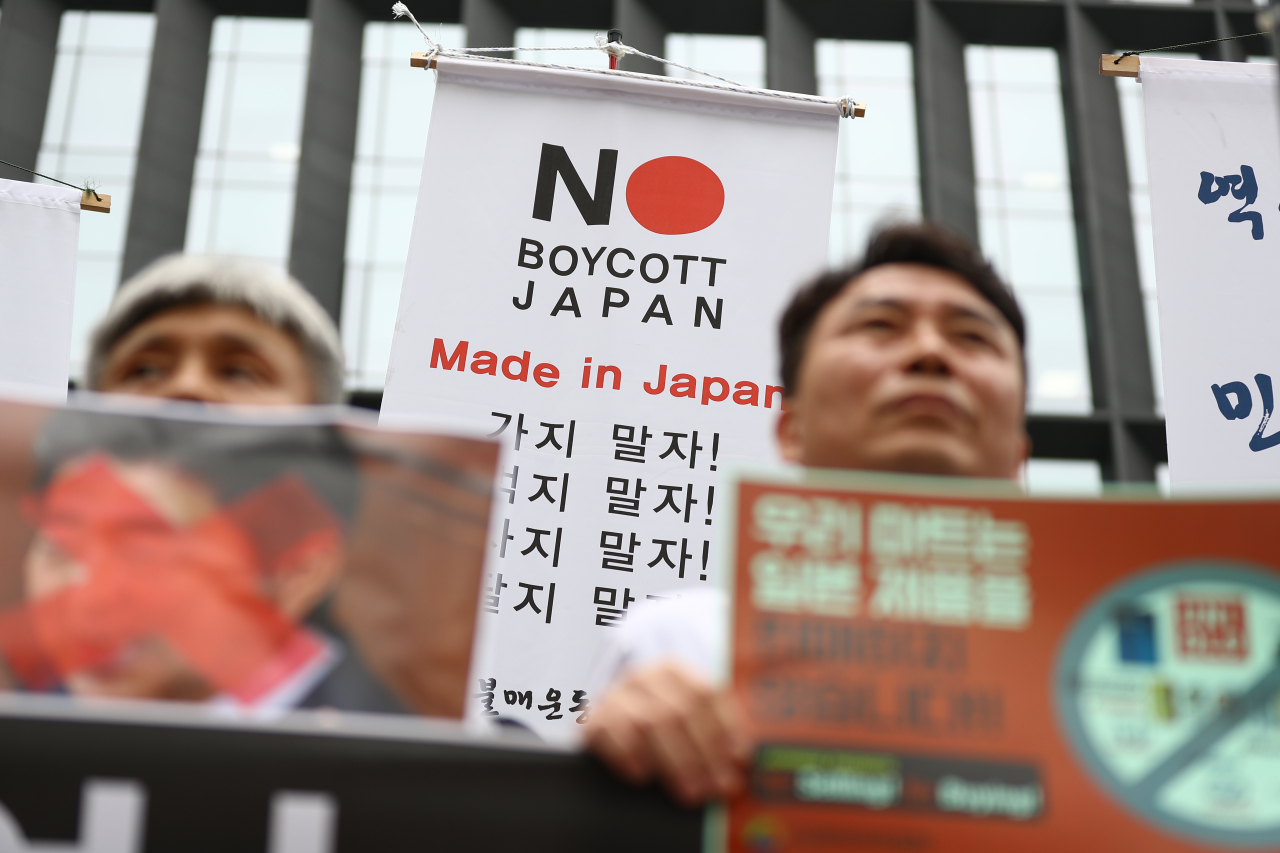The worsening diplomatic row between South Korea and Japan has raised concerns that it may threaten security cooperation among Seoul, Washington and Tokyo.
On July 4, Japan raised the ante with economic retaliatory measures as tensions heightened over the use of forced labor by Japanese companies during the country’s 1910-45 colonization of the Korean Peninsula.
Japan’s announcement of restrictions on exports of items used by South Korean chip and smartphone companies ignited anger and protest here for linking historical and economic issues, which President Moon Jae-in described as a “unwise and unprecedented move.”
Tokyo has insisted that there have been “inappropriate” incidents, including cases affecting national security in which Japanese export materials ended up overseas for weapons use, suggesting illegal transfers to North Korea. Seoul has denied the allegation and proposed an investigation by the United Nations or another international body.
On Tuesday, Japanese Industry Minister Hiroshige Seko stressed that the export curbs have been implemented for reasons of national security. However, Korea believes the restrictions are countermeasures to South Korean court rulings last year that ordered Japanese companies to compensate South Koreans forced to work under harsh conditions during World War II.
This week, the two countries stand at a critical juncture as Thursday is the deadline for South Korea to respond to Japan’s request for the formation of an arbitration panel involving third-country members to the wartime forced labor issue.
Remaining unresponsive to the request may increase the leverage of Japanese officials, who are considering additional measures, including removing South Korea from a “white list” of countries that enjoy streamlined trade for hundreds of potentially sensitive goods with national security implications.
With both sides showing no signs of willingness or desire to make concessions, Seoul has urged Washington to mediate.
Last week, a group of Foreign Ministry officials held a series of talks with officials from the White House and the State Department as well as the Heritage Foundation, to discuss Japan’s tightened controls on exports to South Korea.
“US officials told us that the security realm should avoid possible cross-contamination stemming from the conflict in the economic arena,” a ministry official told reporters on condition of anonymity.
Washington on Seoul-Tokyo row
Strained relations between the two important allies are of grave concern to Washington, as this hinders US security interests in Asia and constrains effective integrated responses to the North Korean military threat.
“The US has shared the view that the situation should not worsen further, and said that it would review it to see if there is any suitable role to play,” the ministry official said.
It would be best for the US to play the role of a behind-the-scenes facilitator to help the two allies reach a compromise, Bruce Klingner, a senior research fellow at the Heritage Foundation, told The Korea Herald via email.
“Washington would not want to be perceived as an arbiter on contentious historical issues,” he said.
If the economic and diplomatic dispute continues to escalate, the US will be concerned about the further undermining of trilateral coordination on North Korea policy and addressing common security threats.
Experts here say that a third-party like China may benefit from the dispute, as the country has been pushing its “Made in China 2025” initiative with the goal of producing 70 percent of the semiconductors it uses by 2025.
“China is likely to capitalize on this opportunity. Neither South Korea nor the US will become a winner in this war,” a source said.
Intel-sharing deal with Japan
With worsening ties, the possibility has emerged that the two countries could annul their bilateral military information pact, called the General Security of Military Information Agreement, or GSOMIA.
The deal, forged in 2016, is automatically renewed if neither side chooses to end it 90 days before the end of a one-year period. This year’s due date for contract renewal falls on Aug. 24.
If Japan decides to scrap GSOMIA, the diplomatic row is likely to worsen because it would amount to a declaration that Korea cannot be trusted to share intelligence.
The intelligence sharing deal also involves US security interests in the region.
GSOMIA’s primary purpose is sharing military information between the two neighboring countries, but it also serves to guarantee security cooperation among the US, South Korea and Japan.
On Tuesday, Defense Ministry spokesperson Choi Hyun-soo said Seoul has not changed its position on extending the deal. He said Tokyo has not brought up the issue so far.
Yang Ki-ho, a professor of Japanese studies at Sungkonghoe University, downplayed the possibility that Japan would terminate the deal, as Washington is opposed to the weakening of the US-South Korea-Japan security triangle.
During the Korean delegation’s visit to the US last week, US government officials said they hoped GSOMIA would not be shaken by the economic row, according to a Foreign Ministry official.
By Park Han-na (
hnpark@heraldcorp.com)






![[Herald Interview] 'Trump will use tariffs as first line of defense for American manufacturing'](http://res.heraldm.com/phpwas/restmb_idxmake.php?idx=644&simg=/content/image/2024/11/26/20241126050017_0.jpg)
![[Exclusive] Hyundai Mobis eyes closer ties with BYD](http://res.heraldm.com/phpwas/restmb_idxmake.php?idx=644&simg=/content/image/2024/11/25/20241125050044_0.jpg)
